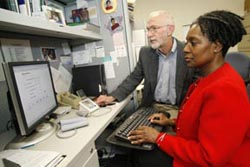Place more than race tied to heart disease risk
|
Where you live might play a bigger role in your risk for heart disease than your ethnicity or race. New research reveals that rural residents were more knowledgeable about healthy eating and heart disease risk than urban residents, but that urban residents were more motivated and optimistic about getting healthy. And further, these differences persisted when the researchers compared rural Caucasians to urban Caucasians. The findings could help healthcare professionals better target heart disease prevention programs. Carol Homko, Ph.D., a researcher at Temple University School of Medicine, suggests that the differences are partly due to lifestyle. |
 Photo by Ryan S. Brandenberg / Temple University
William Santamore, Ph.D., director of telemedicine research, and Ruby Hammond from the cardiology department, demonstrate the heart disease risk prevention website. Study participants enter their health
information such as blood pressure and weight, and interact online with nurses and doctors. |
|
Fresh fruits and vegetables are more plentiful and less costly in rural areas, where it’s also easier and safer to exercise outside. Urban areas often lack good grocery stores, forcing residents to rely on corner stores that don’t have many fresh food selections at reasonable prices. Homko and her fellow researchers presented their findings at the American Heart Association’s Cardiovascular Disease and Epidemiology meeting in Orlando, Fla. (Feb. 28 – March 3), and the American College of Cardiology meeting in New Orleans (March 24 – 27). “We found that urban Caucasians had a lifestyle more similar to urban minorities than rural Caucasians,” said Steve Domsky, M.D., and Abul Kashem, M.D., Ph.D., study authors. “Urban Caucasians, like urban minorities, were younger and had a higher rate of smoking, a higher incidence of diabetes, larger waist size and higher levels of C-reactive protein, an indicator of heart disease risk.” Urban Caucasians’ socioeconomic status fell between that of urban minorities and rural Caucasians. The data come from a clinical trial investigating whether Internet-based telemedicine can decrease cardiovascular disease risk in underserved inner-city and rural populations. The final results of the study, which is being conducted at Temple University in Philadelphia and Geisinger Medical Center in Danville, Pa., are expected in about a year. The project, one of only a few that are entirely Internet-based, is funded by the Pennsylvania Department of Health and headed by Alfred Bove, M.D., professor and chief of cardiology at Temple, and William Santamore, Ph.D., director of telemedicine research and professor of physiology at Temple. The study involves 465 men and women between 18 and 85 years of age with a 10 percent or greater risk of cardiovascular disease. |
|